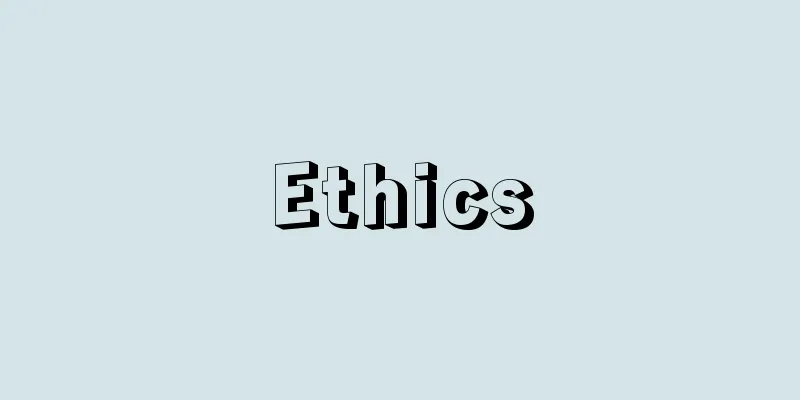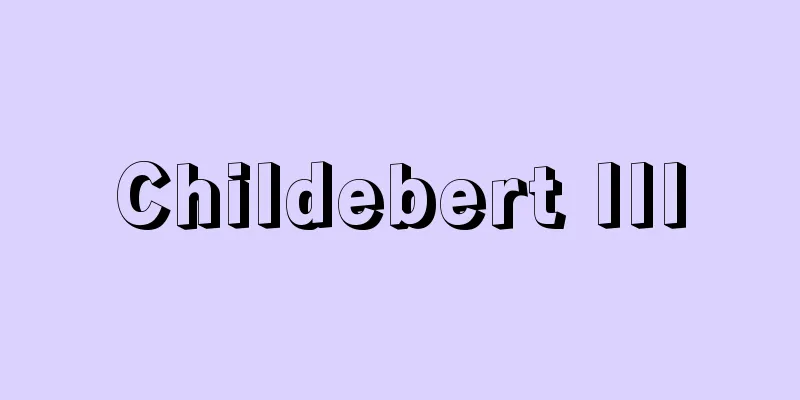Ethics

|
Ethics is a discipline that does not simply accept the morality accepted in society, but instead adds philosophical reflection to it and explores what principles one should live by to live a truly moral life. Or, to put it the same way, ethics can be said to be a discipline that considers how humans should live and explores what kind of life one should choose in order to live a humane life. In this sense, as in the case of Socrates, ethics is originally one with philosophy, but Aristotle's distinction between theoretical science and practical science has become established as a distinction between theoretical philosophy and practical philosophy within philosophy since the early modern period, and today ethics is usually considered to be practical philosophy, a branch of philosophy. [Yoshiaki Utsunomiya] The principles that make morality moralHowever, there are also views, such as those of Lévi-Bruhl and Durkheim, that ethics should be a social science that regards morality, including customs, as a social phenomenon and examines its function and structure through empirical methods. There is also a so-called meta-ethical view that ethics should not set or justify certain norms as in conventional normative ethics, but should analyze the meaning and usage of moral language such as "good" and "ought" from a value-neutral standpoint and clarify the logical structure of sentences that contain such language. However, in order to distinguish moral phenomena from other phenomena or moral language from other languages, it is necessary to know what morality is beforehand. In that sense, the central task of ethics remains the exploration of the principles that make morality moral. [Yoshiaki Utsunomiya] Three PerspectivesIncidentally, there are several different views on moral principles within modern ethics. One of these positions is that morality is rooted in human nature, and therefore there is a universal morality that does not change in any era. A representative example of this position is utilitarian ethics. According to utilitarianism, human nature is to seek pleasure and avoid pain. Given that human nature is such, a morally good act is one that brings as much pleasure as possible to people or relieves as much pain as possible from people. This is why the so-called "greatest happiness for the greatest number of people" is preached. This can be called naturalistic ethics in that it bases morality on the natural human nature of seeking pleasure, but the second position is that humans are beings that change with history, and therefore morality also changes with history, and there is no such thing as eternally unchanging morality. This is the position of historical relativism, and positivist ethics and Marxist ethics, which holds that all morality up to now has been class morality and has served the interests of classes, can be considered to belong to this position. And thirdly, there is the existentialist view that there is no universal human nature that predetermines the way each individual human being should be, and therefore there is no universal morality either. For example, according to Sartre, the existence of each individual human being is freedom, which precedes their essence, and the act of freely creating oneself without being bound by existing values is morally good. Situational ethics, which denies the existence of universal moral laws and emphasizes decisions made according to each situation, can also be said to take this position. In addition, the first view, which accepts the existence of universal morality, is a traditional view that has existed since the Greeks, the second view, which preaches the historical relativity of morality, is a product of the early modern period, and the third view, which emphasizes the ethics of individual existence, is a view that arose in modern times. However, in modern times, these three views still stand in opposition to each other as influential views. [Yoshiaki Utsunomiya] The realm of "between" people and ethicsIn Japan, Tetsuro Watsuji established a unique system of ethics, stating that ethics is the study of "human beings" as "between people." The fundamental structure of human existence is a dual structure of the individual (individual) and the whole (society), which is manifested by a double movement of negation, in which the individual is established by the negation of the whole, and the whole returns to the whole by the negation of the individual. In terms of moral good and evil, evil is when the individual negates the whole and turns away from it, and good is when the individual negates itself again and returns to the whole. Although this dual structure shows the superiority of the whole over the individual, it is possible to view humans as literally "between people" and explore the principles of morality from this perspective, apart from Watsuji's ethics. Moral good and evil are most clearly manifested in the actions of humans toward other humans, and in the actions of the self toward others. If this is the case, the principles of morality can be seen as existing in the realm of "between" between people. If we call this interpersonal nature, then we can say that what is necessary to clarify the principles of morality is not an elucidation of human nature, but rather an elucidation of this interpersonal nature. [Yoshiaki Utsunomiya] "Ethics, Volumes 1 and 2, by Tetsuro Watsuji (1965, Iwanami Shoten) " "Ethics, by Takeo Iwasaki (1971, Yuhikaku)" "Ethics between Human Beings, by Yoshiaki Utsunomiya (1980, Ibunsha)" Source: Shogakukan Encyclopedia Nipponica About Encyclopedia Nipponica Information | Legend |
|
世間で通用している道徳をそのまま受容するのではなく、それについて哲学的な反省を加え、どのような原理に従って生きるのが真に道徳的な生き方であるかを探究する学問。あるいは同じことだが、倫理学とは、人間はいかに生きるべきかを考え、人間らしく生きるためにはどのような生き方を選んだらよいかを探究する学である、ともいえよう。そうした意味では、ソクラテスの場合のように、倫理学はもともと哲学と一体であるが、アリストテレスによる理論学と実践学の区別は、近世以降、哲学内部における理論哲学と実践哲学の区別として定着し、今日では倫理学は実践哲学として、哲学の一部門とみなされるのが普通である。 [宇都宮芳明] 道徳を道徳たらしめる原理もっともこれとは別に、レビ・ブリュールやデュルケームのように、倫理学は習俗をも含めて道徳を社会的な一現象としてとらえ、その機能や構造を実証的方法によって考察する社会科学であるべきだとする見方もある。また倫理学は従来の規範倫理学のように、ある種の規範を設定したり根拠づけたりするのではなく、もっぱら「よい」とか「べき」といった道徳言語の意味や用法を価値中立的立場から分析し、それらの言語を含む文の論理的構造を明らかにすべきだといった、いわゆるメタ倫理学の見方もある。しかし道徳現象を他の現象から区別したり、道徳言語を他の言語から区別したりするためには、それに先だってすでに道徳とは何かが知られていなければならない。そうした意味で、倫理学の中心課題は、依然として道徳を道徳たらしめている原理の探究にあるといえるであろう。 [宇都宮芳明] 三つの見方ところで、道徳の原理に関しても、現代の倫理学の内部でいくつかの異なった見方がある。 その一つは、道徳は人間固有の本性に根ざしており、したがっていつの時代にも変わらない普遍的な道徳が存在するとみる立場で、その代表としては功利主義の倫理があげられる。すなわち功利主義によると、人間は快を求め苦を避けるという本性をもつ。人間がこうした本性をもつ以上、道徳的によい行為とは、できるだけ多くの快を人々にもたらすか、あるいは人々からできるだけ多くの苦を取り除く行為である。いわゆる「最大多数の最大幸福」が説かれる所以(ゆえん)である。 これは、快を求めるという人間の自然的本性に道徳の基礎を置く点で、自然主義的倫理学といってよいが、他方第二の立場として、人間は歴史とともに変化する存在であり、したがって道徳も歴史とともに変化し、永遠不変な道徳は存在しないとみる立場がある。これは歴史的相対主義の立場であって、実証主義の倫理学や、これまでの道徳はいずれも階級道徳であり、階級の利益に奉仕するものだとするマルクス主義の倫理学は、この立場に属するとみてよいであろう。 そして第三に、個々の人間のあり方をあらかじめ規定しているような普遍的な人間本性は存在せず、したがって普遍的な道徳もまた存在しないとする実存主義の見方がある。たとえばサルトルによると、人間各自の実存は本質に先だつものとして自由であり、既成の価値にとらわれずに自由に自己を創造していく行為が道徳的に善である。普遍的な道徳法の存在を否定し、そのつどの状況に応じた決断を重視する状況倫理もまた、この立場にあるといえよう。 なお付け加えると、普遍的な道徳の存在を認める第一の見方はギリシア以来の伝統的な見方であり、道徳の歴史的相対性を説く第二の見方は近世の産物であり、個別的な実存の倫理を重視する第三の見方は現代に生じた見方である。しかし現代ではこの三つの見方がそれぞれなお有力な見方として鼎立(ていりつ)しているのが現状である。 [宇都宮芳明] 人間の「間」の領域と倫理日本では、和辻哲郎(わつじてつろう)が、倫理学は「人の間」としての「人間」の学であるとして、独自な体系を樹立した。人間存在の根本構造は個(個人)と全(社会)の二重構造であり、それは全の否定によって個が成立し、個の否定によって全が全に還帰するという、二重の否定運動によって顕現する。道徳的善悪に関していえば、個が全を否定して全から背き出るのが悪であり、個が自らをふたたび否定して全に戻るのが善である。ここには二重構造といっても、個に対する全の優位が示されているが、しかしこうした和辻倫理学とは別に、人間を文字どおり「人の間」にあるものとしてとらえ、そうした視点から道徳の原理を探ることも可能であろう。道徳的善悪は、人間の人間に対する行為、自己の他人に対する行為のうちにもっとも明瞭(めいりょう)な形で現れる。とすれば、道徳の原理は人と人とをかけ渡す「間」の領域にあるとみることができる。それをかりに人「間」性とよべば、道徳の原理の解明にとって必要なのは、人間本性の解明ではなく、むしろこうした人「間」性の解明である、といえるであろう。 [宇都宮芳明] 『和辻哲郎著『倫理学』上下(1965・岩波書店)』▽『岩崎武雄著『倫理学』(1971・有斐閣)』▽『宇都宮芳明著『人間の間と倫理』(1980・以文社)』 出典 小学館 日本大百科全書(ニッポニカ)日本大百科全書(ニッポニカ)について 情報 | 凡例 |
<<: Ethical Theology - Linglishingaku
>>: Hayashi Yuraku - Rin Yugaku
Recommend
Ichigoe - Ichikotsu
〘Noun〙 (abbreviation of "Ichikotsucho (Ichigo...
Hitachiota [city] - Hitachiota
Located in the central north of Ibaraki Prefecture...
Menthol - Mentooru (English spelling)
A representative monocyclic monoterpene alcohol. ...
Muḥammad 'Ali
1769‐1849 Governor of Egypt; founder of the Muhamm...
Kurayoshi [city] - Kurayoshi
A city in central Tottori Prefecture. It was incor...
Ant nose money - Gibisen
The name of bronze coins used in the Chu state du...
Okyozuka ruins - Okyozukaiseki
This is a settlement site from the late to final J...
A'nyêmaqên [Mountain Range] (English spelling)
Located in the southeastern part of Qinghai Provin...
Kujikasagake - Kujikasagake
...It is one of the archery games performed for m...
Emperor Yozei
The 57th Emperor (reigned 876-884). First son of ...
War crimes
War crimes can be classified into narrow and broa...
Ostwald
German physical chemist. Born in Latvia, which wa...
Marsilius (of Padua)
Around 1275 - 1343 Italian political theorist. Bor...
Kitayama culture
A general term for the culture that flourished fr...
Protein (protein) - protein
Proteins are the most basic substances that make u...

![Order of Malta (English: Ordre militaire de Malte) [France]](/upload/images/67ccec186e1a7.webp)







